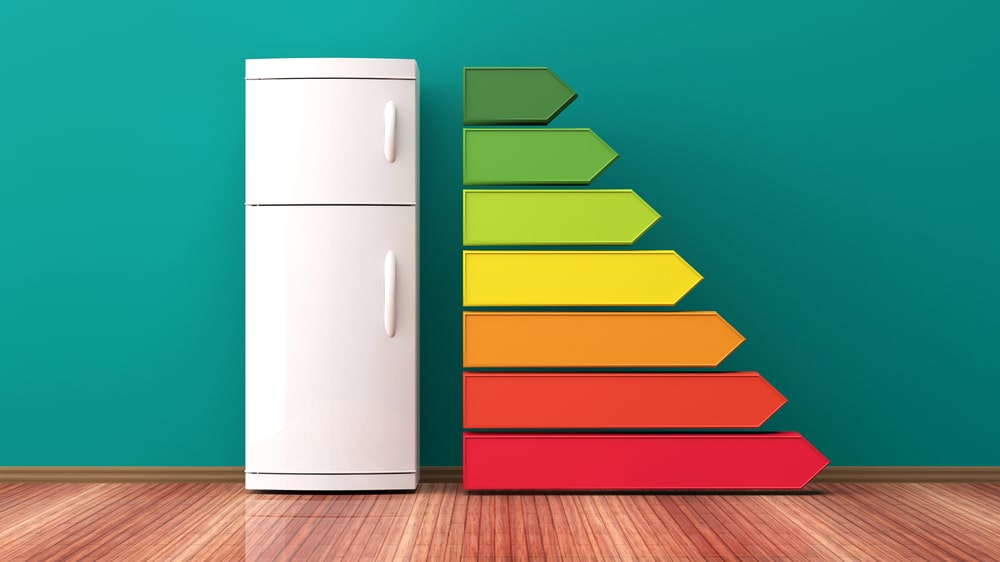Article at a Glance
- Refrigerator Energy Usage: Refrigerators consume 300-800 watts on average but typically use less due to cycling. They account for about 18-20% of household energy consumption.
- Cost of Operation: Monthly refrigerator costs depend on local electricity rates and appliance efficiency. ENERGY STAR models use up to 15% less energy, reducing costs.
- Solar Panel Requirements: Only one to three solar panels are typically needed to power a refrigerator. Factors like location, seasonal changes, and surge power demands influence solar system sizing.
- Energy Savings with Solar: Solar panels can significantly reduce refrigerator operating costs, contributing to lifetime energy savings of $10,000-$30,000 while lowering your environmental impact.
Your fridge runs 24/7, making it one of the biggest energy consumers in your home. So, how many watts does a refrigerator use? Understanding the average wattage usage of this appliance can help you make informed decisions about energy efficiency and potential solar panel installations.
Our RxSun team outlines how many watts refrigerators use and how this impacts your property’s energy costs.
What’s the Average Refrigerator Wattage?
The average refrigerator uses 300-800 watts of electricity. However, your appliance’s actual power usage is typically much lower than its stated wattage because it cycles on and off throughout the day.
To estimate your refrigerator’s energy consumption, divide its wattage by three. For example, a 500-watt fridge consumes about 167 watts during operation.
Several factors affect this appliance’s power consumption, including:
- Size and age of the unit
- Additional features like ice makers or water dispensers
- Door seal condition
- Coil cleanliness
- Interior temperature settings
How Much Does It Cost To Power a Refrigerator?
Your monthly refrigerator costs depend on your local electricity rates and your unit’s power consumption. To calculate your refrigerator’s operating costs, multiply your daily energy usage (approximately four kilowatt-hours) by your local electricity rate.
Several factors influence operating costs:
- Your local utility rates
- The fridge’s age and efficiency
- Daily usage patterns and door openings
- Interior temperature settings
- Seasonal temperature changes
You can reduce these costs by choosing a model with a high-efficiency rating, maintaining proper door seals, and keeping the unit well-maintained. ENERGY STAR-certified refrigerators typically use 15% less energy than standard models, leading to notable savings over time.
How Many Solar Panels Does It Take To Run a Refrigerator?
Since your refrigerator operates continuously, you need reliable solar power to keep it running. In optimal conditions, most residential solar panels generate around 350 watts. Since refrigerators consume 300-800 watts, you’ll need one to three solar panels to ensure consistent operation.
Your location’s solar production capacity directly impacts panel requirements. Northern states like Wisconsin and Michigan receive fewer peak sun hours than Florida, requiring additional panels to generate the same power. For example, a solar system in Illinois might need an extra panel to account for cloudy days and shorter winter daylight hours.
Understanding surge power requirements is crucial for proper system sizing. When your refrigerator’s compressor starts, it can briefly demand two to three times its normal running wattage. Your solar system must handle these power spikes while maintaining consistent energy flow to other appliances.
Battery storage becomes essential for nighttime operation. Most solar installations include battery backup to power your refrigerator when the sun isn’t shining. The battery system must store enough energy to run the fridge through the night and during extended cloudy periods.
Temperature variations affect both solar panel output and refrigerator efficiency in the following ways:
- Higher ambient temperatures reduce solar panel efficiency
- Hot weather increases your refrigerator’s power consumption
- Seasonal changes impact overall system performance
- Panel placement and orientation affect daily power generation
- Shading from nearby structures can reduce system output
How Much Electricity Does a Home Use?
Now that you know the answer to “How many watts does a refrigerator use?” you might also wonder how it relates to your home’s total electricity usage. The average American home consumes approximately 10,715 kWh of electricity annually, or 893 kWh monthly. Your refrigerator’s power usage accounts for roughly 18-20% of household energy consumption.
This percentage varies based on:
- Seasonal temperature changes
- Overall home size
- Number of occupants
- Appliance efficiency levels
Every kilowatt-hour of electricity you save reduces your environmental impact and utility bills. Small changes in your daily habits, like running major appliances during off-peak hours or upgrading to energy-efficient models, can significantly reduce your home’s power consumption. You can track these savings through your utility’s online portal or a home energy monitoring system.
Additional Read: The Role of an Energy Consultant in Sustainable Home Upgrades
How Much Money Can Solar Panels Save You on Fridge Voltage and Watts?
Installing solar panels can significantly reduce your refrigerator’s operating costs. Most homeowners save between $10,000 and $30,000 on total energy costs over their solar system’s lifetime. Your refrigerator’s fridge voltage and watts contribute substantially to these savings potential.
Key savings factors include:
- Local electricity rates
- Solar panel system size
- Available tax incentives
- System efficiency
- Installation quality
Why Choose RxSun for Your Energy Solutions?
Understanding the answer to “How many watts does a refrigerator use?” is crucial for managing home energy efficiency and exploring renewable energy options like solar power. You can reduce your environmental impact and utility expenses by choosing energy-efficient models, maintaining your appliance, and considering solar panel installations.
At RxSun, we understand how many watts a refrigerator uses and how this impacts your energy decisions. We specialize in helping homeowners reduce their energy costs through efficient solar solutions.
Ready to learn more about powering your fridge with solar? Contact our RxSun professionals at (800) 607-9786 for a free consultation in Florida, Wisconsin, Michigan, and Illinois.
 800-607-9786
800-607-9786

 1-800-60-RXSUN
1-800-60-RXSUN